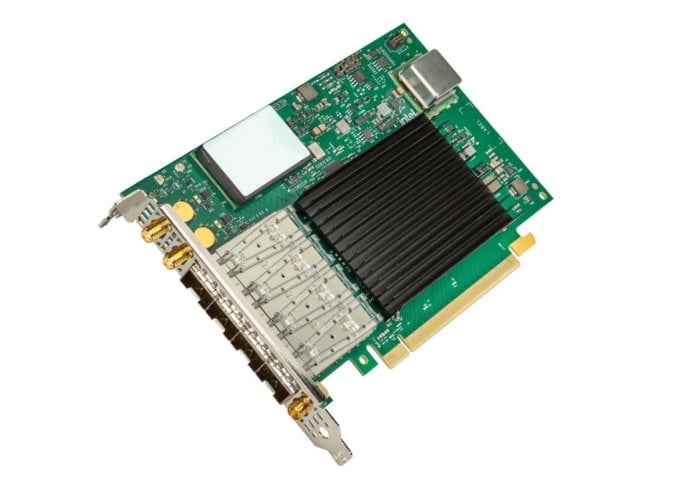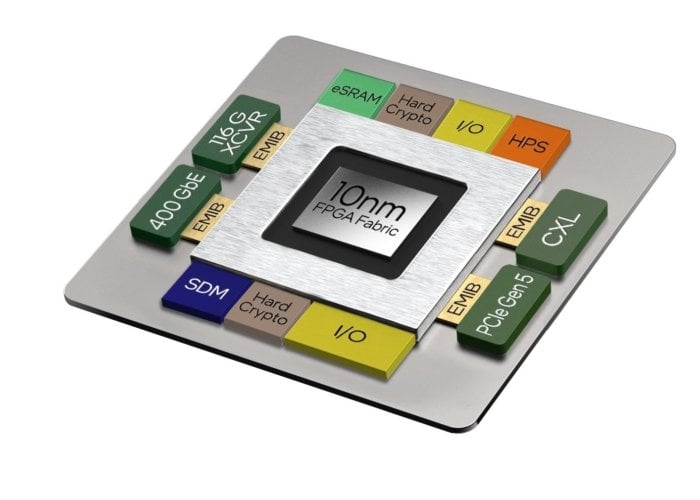electronics-journal.com
22
'21
Written on Modified on
INTEL’S SILICON, SOFTWARE ACCELERATE 5G, EDGE
Intel technologies power vRAN momentum and edge build-out.

What’s New: Today as part of its MWC 2021 virtual event, Intel showcased multiple groundbreaking network deployments powered by its technology and unveiled the Intel® Network Platform. It also announced new additions to its leading product portfolio for 5G and edge, reaffirming its position as the leading network silicon provider. The company confirmed its leadership in virtual radio access network (vRAN), noting nearly all commercial vRAN deployments are running on Intel® technology. In the years ahead, it sees global vRAN base station deployments scale, from hundreds to “hundreds of thousands,” and eventually millions.
“Network transformation is critical to unleash the possibilities of 5G and maximize the rise of the edge to create new and better business outcomes for our customers across the globe. As the leading network silicon provider, we have been driving this shift to virtualizing the core to access to edge, and implementing edge computing capabilities with our decade of experience, to power our society’s digital revolution.” - Dan Rodriguez, Intel corporate vice president, Network Platforms Group.
Why It Matters: Operators desire a more agile, flexible infrastructure to unleash the full possibilities of 5G and edge as they address increased network demands from more connected devices. At the same time, the digitalization of our world is creating new opportunities to use the potential of 5G, edge, artificial intelligence (AI) and cloud to reshape industries ranging from manufacturing to retail, healthcare, education and more. According to a recent survey of 511 information technology decision-makers, 78% believe 5G technology is crucial to keep pace with innovation.These decision-makers also revealed that they view edge as one of the top three use cases for 5G in the next two years. With Intel’s expansive portfolio delivering feature-rich silicon and optimized software solutions, the company can tap into an estimated $65 billion edge silicon opportunity by 2025. Intel technology is already deployed in over 35,000 end customer edge implementations.About Network Deployments and Innovations: Operators like Deutsche Telekom, Dish Wireless and Reliance Jio are transforming networks and relying on Intel technology. Their work demonstrates how Intel’s experience and proven technology help them create innovative solutions to deliver on their vision.
- Reliance Jio announced it will do co-innovations with Intel in 5G radio and wireless core, and collaborate in other associate areas that include AI, cloud and edge computing, which will help it as they deploy 5G.
- Deutsche Telekom is using Intel® FlexRAN technology with accelerators in O-RAN Town, in the O-RAN network it is deploying in Neubrandenburg, Germany — a city of 65,000 people spread out over 33 square miles. The company is relying on Intel as a technology partner as it delivers high-performance RAN at scale.
- DISH Wireless relies on Intel’s contributions to the 5G ecosystem as it builds out the first cloud-native 5G network in the United States. The launch in its first city, Las Vegas, as well as its nationwide network, will be deployed on infrastructure powered by Intel technology in the network core, access and edge.
- Cohere is pioneering a new approach to improve spectrum utilization by leveraging capabilities in FlexRAN. It is integrating and optimizing spectrum multiplier software in the RAN intelligent controller. Cohere’s testing shows its Delay Doppler spatial multiplexing technology is improving channel estimation and delivering up to a two-times improvement in spectrum utilization for operators. That’s what Vodafone has seen in 700Mhz testing in its labs.

About Maximizing Data at the Edge: By 2023, it is expected that 75% of data will be created outside of the data center — at the edge, in factories, in hospitals, in retail stores and across cities. Developers want to converge various capabilities at the edge, such as AI, analytics, media and networking. Intel offers a diverse edge-ready product portfolio that includes feature-rich silicon including next-gen Intel® Xeon® D processors, open and optimized software, and hundreds of preconfigured and integrated edge-to-cloud solutions delivered through a global partner ecosystem.
- EXOR International teamed with Intel to enable an end-to-end smart factory in Verona, Italy, as an example of the benefits of Industry 4.0 digitalization to manufacturers of all sizes. Intel® Xeon® and Intel Atom® processors and Intel® FPGAs power its network and edge infrastructure, Intel® Edge Controls and Intel® Edge Insights for Industrial software further improve data insights, and Intel® OpenVINO Toolkit is used for quality inspection. This solution includes data integration from human resources, sales, marketing and logistics, and provides EXOR International with real-time operational benefits, including employee scheduling and time-off tracking, weekly inventory and supply tracking, and production and order recordkeeping.
- Cellnex Telecom, with support from Intel, Lenovo and Nearby Computing, is delivering new, innovative edge capabilities as Cellnex services a wide range of vertical deployments. Optimizing the use of the hardware and the management of the services, Cellnex’s solution is based on Intel® Smart Edge Open. It allows Cellnex to act faster on data and provide service-level management, improve quality of service and deliver a more consistent experience to its end users. Deployed in Barcelona, this solution will extend to more markets using this same blueprint developed with Intel and Nearby Computing.
About Foundational Technology: Intel offers the most complete portfolio of network solutions for the industry to build on, with a full suite of processors, accelerators, Ethernet adapters, memory, software toolkits and solution blueprints. The company is expanding its leadership product portfolio to help customers achieve the right total cost of ownership and accelerate their time to market.vAbout Foundational Technology: Intel offers the most complete portfolio of network solutions for the industry to build on, with a full suite of processors, accelerators, Ethernet adapters, memory, software toolkits and solution blueprints. The company is expanding its leadership product portfolio to help customers achieve the right total cost of ownership and accelerate their time to market.
- Intel Network Platform is a technology foundation that can reduce development complexity, accelerate time to market and help to ensure customers and partners can take advantage of the features in Intel hardware, from core to access to edge. No other silicon provider offers this type of flexible, comprehensive software environment. Intel Network Platform includes system-level reference architectures, drivers and software building blocks that enable rapid development and delivery of Intel powered network solutions offering an easier, faster path to develop and optimize network software.
- Intel® Smart Edge consists of two software offerings for the multi-access edge computing layer that will now have a unified architecture and codebase to help customers onboard and manage edge applications and network functions, whether they want to buy a commercial solution or build their own solution. Intel Smart Edge is commercial software focused on enterprise on-premise use cases, such as private networks and universal Customer Premise equipment. The evolved and enhanced Intel Smart Edge Open (formerly known as OpenNESS) is an open software toolkit that enables developers to build highly optimized and performant edge platforms.
- Intel® Agilex FPGA family is expanding, with a new FPGA with integrated cryptography acceleration that can support MACSec in 5G applications. This adds another layer of security to vRAN at the fronthaul, midhaul and backhaul levels.
- Intel® Ethernet 800 Series family is expanding, with Intel’s first SyncE capable Ethernet Adapter that is designed for space-constrained systems on the edge, and well-suited for both high-bandwidth 4G and 5G RAN as well as other time- and latency-sensitive applications in sectors such as industrial, financial and energy.

